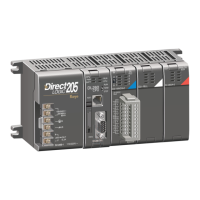Expanding DL205 I/O
I/O Expansion Overview
Expanding I/O beyond the local chassis is useful for a system which has a sufficient number
of sensors and other field devices located a relatively long distance from the CPU. There are
two forms of communication which can be used to add remote I/O to your system; either a
Ethernet or a serial communication network. A discussion of each method follows.
Ethernet Remote Master, H2-ERM(100, -F)
The Ethernet Remote Master, H2-ERM(100, -F), is a module that provides a low-cost, high-
speed Ethernet Remote I/O link to connect either a DL240, a DL250-1 or a DL260 CPU to
slave I/O over a high-speed Ethernet link.
Each H2-ERM(100) module can support up to 16 additional H2-EBC systems, 16
Terminator I/O EBC systems, or 16 fully expanded H4-EBC systems.
The H2-ERM(100) connects to your control network using Category 5 UTP cables for
distances up to 100 meters (328 ft.). Repeaters are used to extend the distances and to expand
the number of nodes. The fiber optic version, H2-ERM-F, uses industry standard 62.5/125
ST-style fiber optic cables and can be run up to 2,000 meters (6560 ft.).
The PLC, ERM and EBC slave modules work together to update the remote I/O points.
These three scan cycles are occurring at the same time, but asynchronously. We recommend
that critical I/O points that must be monitored every scan be placed in the CPU base.
DL205 User Manual, 4th Edition, Rev. B
4–17
Chapter 4: System Design and Configuration
1
2
3
4
5
6
7
8
9
10
11
12
13
14
A
B
C
D
Specifications H2-ERM H2-ERM100 H2-ERM-F
Communications
10BaseT Ethernet 10/100BaseT Ethernet 10BaseFL Ethernet
Data Transfer Rate
10Mbps 100Mbps 10Mbps
Link Distance
100 meters (328 ft) 2000 meters (6560 ft)
Ethernet Port
RJ45 ST-style fiber optic
Ethernet Protocols
TCP/IP, IPX
TCP/IP, IPX, Modbus
TCP/IP, DHCP,
HTML configuration
TCP/IP, IPX
Power Consumption
320mA @ 5VDC 450mA @ 5VDC

